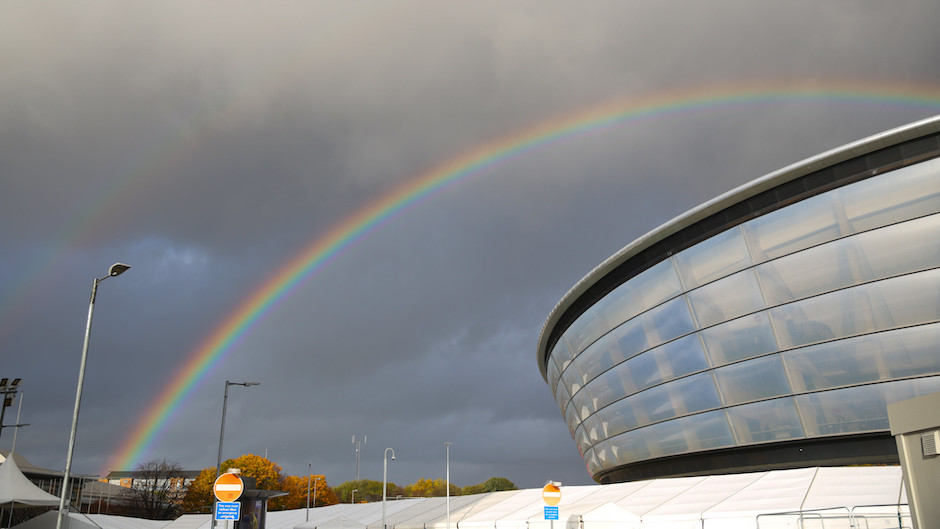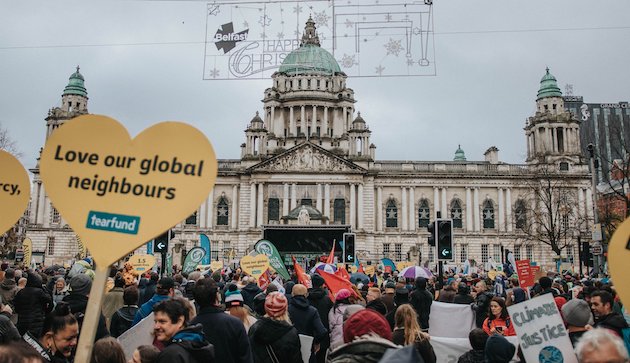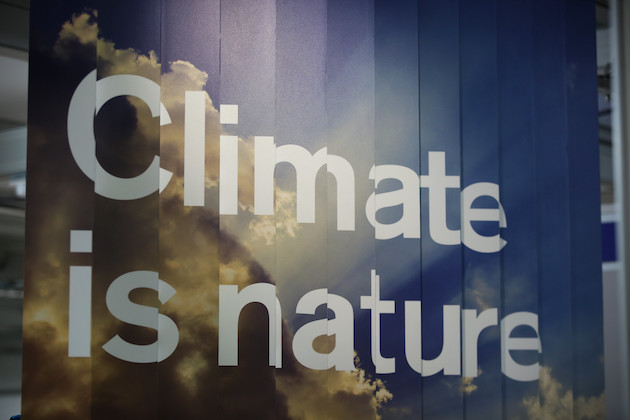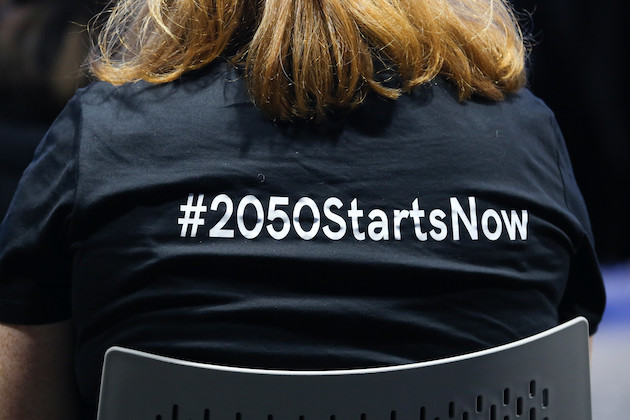Miguel Wickham analyses the COP26 development, the challenges in addressing climate change, and the role of Christians.
 A rainbow over the convention centre where COP26 is being held these days, in Glasgow / Kiara Worth, COP26, UN.
A rainbow over the convention centre where COP26 is being held these days, in Glasgow / Kiara Worth, COP26, UN.
The COP26 Climate Conference has entered its second week, awaiting agreements that will lead to real commitments.
So far, the participating countries have made many announcements, but negotiations are still going, in order to achieve a final agreement that will be a turning point or, as Fernando Forgioni said in a recent interview, a real hinge that will bring a new stage, more sustainable and responsible with our environment.
The final document should point to a reduction in the use of coal and fossil fuels, less deforestation and greater protection of forests and natural spaces; or an economic item that really allows developing countries not to slow down their growth because they do not massively use materials that put the planet's climate balance at greater risk.
One of the evangelical voices on creation care is Miguel Wickham, author of the book "Ecology and Climate Change", who has also written several articles on the climate situation and the response as Christians in his Spanish blog Te(c)ology.
Question: How do you assess the countries' compliance with the agreements reached at COP21 in Paris or COP25 in Madrid?
Answer. They have not been fulfilled. COP25 in Madrid in 2016 ended badly when the parties failed to agree on the quantification and timing of their Nationally Determined Contributions (NDCs), which are the concrete climate actions that each country committed to present every 5 years (until 2030).
Until a few days ago, only a dozen countries out of 194 are up to date. In the Paris agreement, 30-55% emission reductions would be needed to reach the target of a 1.5°C increase. With what exits so far (pledged and promised) only 7.5% would be reduced.
At best, this would be a temperature rise of 2%, but many analysts consider that to be very optimistic, given the lack of commitment from some of the most polluting countries.
There was also a lack of agreements for international cooperation, for example to establish an international carbon market (as is the case in the EU). Environmentalists see this concept as temporary and advocate an urgent energy transition to renewable energies, such as solar, wind and hydrogen.

Q. New global agreements are expected to be reached at COP26 that will have an impact on curbing global warming. Is the current climate situation urgent?
A. Yes, the current climate situation is urgent, as scientists keep warning us. The recent IPCC report (the sixth since 1988) was very strong on this. Never before in all the reports has there been such an urgent call.
In the first 5 reports these researchers have always been temperate, trying to avoid exaggerations and conclusions without objective basis, but I would say that in this report it was very clear that they are very tired of the little response to their reports from national politicians, due to short-term economic interests and the preservation of the welfare of some countries.
The countries that already suffer the effects of climate change, mostly the so-called LDCs (Least Developed Countries) are very concerned, seeing that developed countries are not signing agreements and not fulfilling their promises and commitments.
One of those is an annual fund of 100 billion dollars (a green reserve) to mitigate the effects. They have only reached 89 million per year, which is just a symbolic amount.
The pressure on politicians from the fossil energy industry, the car industry, the cement industry, etc. is just a reflection of the fact that the richest countries do not want to lose their comfort and standard of living.
The pressure from green lobbies and NGOs is growing, but in Glasgow the very high prices of hotels and flats (1000 Euros a day is a low average) make it impossible for many to be present. Young people have to suffer the Scottish cold and rain under bridges.
Q. The post-pandemic commercial and industrial revival is boosting energy consumption. Is a reduction in the burning of coal or other fossil fuels possible or sustainable in the face of growing demand as expected in the coming years?
A. In general, in the countries with the highest consumption, people have saved money and they are buying. Industry can't keep up, demand outstrips supply in everything, and prices are rising.
Regarding energy, global geopolitical situations and huge demand from China are creating major supply problems and rising prices.

[photo_footer]One of the COP26 themes./ Kiara Worth, COP26, UN. [/photo_footer]
We are paying for the lack of foresight and continued reliance on fossil energies, which are running out, and an energy transition to renewable energies has not yet been developed as it could have been.
This creates dangerous and worrying global economic and political instability. France and the EU have just said that nuclear and gas should remain important, in this transition period and that will reduce investments in renewables.
Everything is possible, but there is a lack of vision and political will, a sacrifice now that will pay off in the longer term.
Q. What role can Christians play in this context?
A. I summarise it in 3 points:
1. Total support to organisations that are trying to influence for the good of the millions who are and will be suffering because of the selfishness of the more developed countries.
Christians agree on the diagnosis, but we have much deeper reasons than just the survival of our children and grandchildren and the human race. Creation is God's, not ours, and we must reflect his love for it as we love and care for it.
2. Prayer: On 8 September Catholics, Eastern Orthodox and Anglicans called for prayer for the politicians at the summit, followed by a call from 40 denominations to increase climate ambition.
Christians should cry out to God for leaders to act with courage and firmness, and for positive agreements to come out of the summit.
3. Live consistently with what we know of God, who He is and what He asks of us in a suffering world that has turned its back on Him. He is the one who sustains everything.

[photo_footer] 2050 is targeted as a horizon for meeting the goals/Kiara Worth, COP26, UN [/photo_footer]
The apostle Paul reminds us that Christ is the Creator and sustainer of all (Colossians 1:15-20). The Bible calls us to love what God loves, His entire creation. We are part of the creation, but different from it, because a) we are made 'in the image and likeness of God' (Genesis 1:26), and b) because we have a mandate, to manage and care for God's Garden, as gardeners, stewards (Genesis 1:26-28 and 2:15).
It reminds us that God is in control and that our destiny and that of the people is in His hands , and it calls us to return to Him.
The present situation of creation, which 'groans, waiting for deliverance' (Romans 8: 20-22) is the result of turning our backs on God, and we should see the problems as warnings, (as the Old Testament prophets already announced thousands of years ago about the consequences of following the Creator's instructions and recommendations).
But the Bible's promises of new heavens and a new earth talk of a completely transformed creation when Christ comes again in glory.
The believer is called to live now in that hope and reality, loving and caring for the incredible creation that God has made and continues to maintain. Because it is His, (Genesis 1:1, 31) and because He has charged us with its stewardship.
This is only possible when God changes man's heart by His Spirit. True transformation is spiritual, and must begin in the heart. That is why the Christian has the true analysis of ecological challenges and evil in general, and the true and only solution to it in the Bible.
The Kingdom of God came when Christ came to live in His creation, and His resurrection confirms and points to ours, and to that of the whole creation, which is waiting to be 'set free from the bondage of corruption' (Romans 8:21).
The subjects of the kingdom live each day in hope, in His power and in the anticipation and assurance that He is with us now and is coming soon.
I quote David Bookless: 'In the classic Bollywood film Salaam-e-Ishq, there is a scene in which an unlikely hero, a middle-aged Delhi taxi driver with a love affair, is rebuked by his friend for dreaming of his own 'Perfect Lady'. He then says: "It is not a dream...It is a fact of future truth" (Planetwise: dare to care for God's world, by David Bookless (2008).
Christian hope is not a dream. It is grounded in the reality of a God who creates, sustains and saves; it is based on solid foundations. No matter how the world around us goes, hope for the planet is a fact of future truth.

Las opiniones vertidas por nuestros colaboradores se realizan a nivel personal, pudiendo coincidir o no con la postura de la dirección de Protestante Digital.
Si quieres comentar o